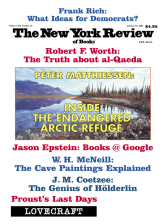In response to:
Power Grab from the June 22, 2006 issue
To the Editors:
Elizabeth Drew justly faults “the press” for taking “little notice” of George W. Bush’s “unprecedented reach for power,” thus enabling him to carry it out “largely in obscurity [“Power Grab,” NYR, June 22]. But an important distinction should be drawn. At leading news organizations, commentators sometimes do indeed take notice of truly important news even as, strangely, their news colleagues ignore it. The Boston Globe’s April 30 jaw-dropper on Bush’s I-am-the-law presidential signing statements is an example. “President Bush,” the story began, “has quietly claimed the authority to disobey more than 750 laws enacted since he took office, asserting that he has the power to set aside any statute passed by Congress when it conflicts with his interpretation of the Constitution.”
Some leading newspapers took prominent notice of the Globe’s report in commentaries, print as well as on-line, while taking no notice in their news columns. The Washington Post and The New York Times are cases in point. At washingtonpost.com, Dan Froomkin wrote in his “White House Briefing” column that the Globe’s Charlie Savage had weighed in “with the most authoritative—and most alarming—story yet on Bush’s proclivity for signing statements.” On the Post’s Op-Ed page, Michael Kinsley also found the disclosure “alarming.” The Times, in a top-of-the-page editorial, expressed deep concern. Yet the very disclosure that greatly disturbed Froomkin, Kinsley, and the Times editorial board went unreported in the news pages of the Post and Times and other newspapers.
By contrast, the American Bar Association did much more than take notice of Savage’s report: it created an independent, nonpartisan, ten-member task force to study thoroughly the implications of presidential signing statements. “The issue to be addressed…is of great consequence to our constitutional system of government and its delicate system of checks and balances and separation of powers,” ABA President Michael S. Greco said. The task force will prepare a report with policy recommendations for the August meeting of the ABA’s House of Delegates.
Savage broke the ABA story on June 4, a day before the official announcement. Thus, Froomkin wrote at washingtonpost.com, he “continues to play the one-man band on a wildly undercovered aspect of this underreported story.” Much like Drew, Froomkin recognized the signing statements as part of what will likely be “the biggest story of the Bush presidency…its dramatic expansion of executive power—engineered by Vice President Cheney, unchecked by a supine Congress, and underreported by the traditional media.”
In the columns of The Washington Post, The New York Times, and other newspapers, the ABA action was not merely “wildly unreported” and “underreported”; it got no ink at all. As in the case of Savage’s original report, conventional journalistic wisdom was thus turned on its head. The state—the news department—reported neither the news of the 750 signing statements nor of the ABA action, while the church—the editorial department—reported both.
For real news to appear first, or only, in commentary is not uncommon. In his Saturday Post Op-Ed column, for example, editorial writer Colbert King routinely does valuable investigative reporting not done by the Metro staff. What is uncommon is for a newspaper executive to acknowledge the phenomenon. Kenneth F. Bunting, associate publisher of the Seattle Post-Intelligencer, did that on June 9, when he wrote in the P-I about “bad news judgment.” One of his examples was “the infamous Downing Street memo,” theLondon Times story that the US mainstream media initially greeted with a collective yawn (the Review published it in full, with a commentary by Mark Danner, and later as a short book). The P-I’s editorial pages,” he pointed out, “noted the secret British memo in columns before news of it was finally published on the news pages of ours and most other US newspapers.” That Bunting published his article on the editorial page was fitting; that he published it anywhere is newsworthy.
Morton Mintz
Senior Adviser
The Nieman Watchdog Project
Washington, D.C.
Elizabeth Drew replies:
Morton Mintz makes a good point, though it was not my topic. His point and statistics are an elaboration on what I wrote: that the undermining of the Constitution isn’t considered “news.” (The blogs have, however, written a great deal about this issue.) He has done valuable work to show this more extensively. As for the Boston Globe story about signing statements (which I mentioned), again he’s right about it’s not being covered in news stories. Not only did other newspapers not consider it newsworthy, but also in general they are not inclined to be generous about citing other papers’ news—unless they consider it such a big story that they have to. (The International Herald Tribune did run the Savage story.) Nevertheless, the Globe piece, picked up by columnists and editorial pages as it was, was still highly influential.
This Issue
October 19, 2006



